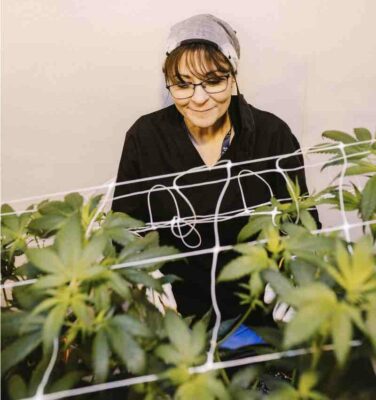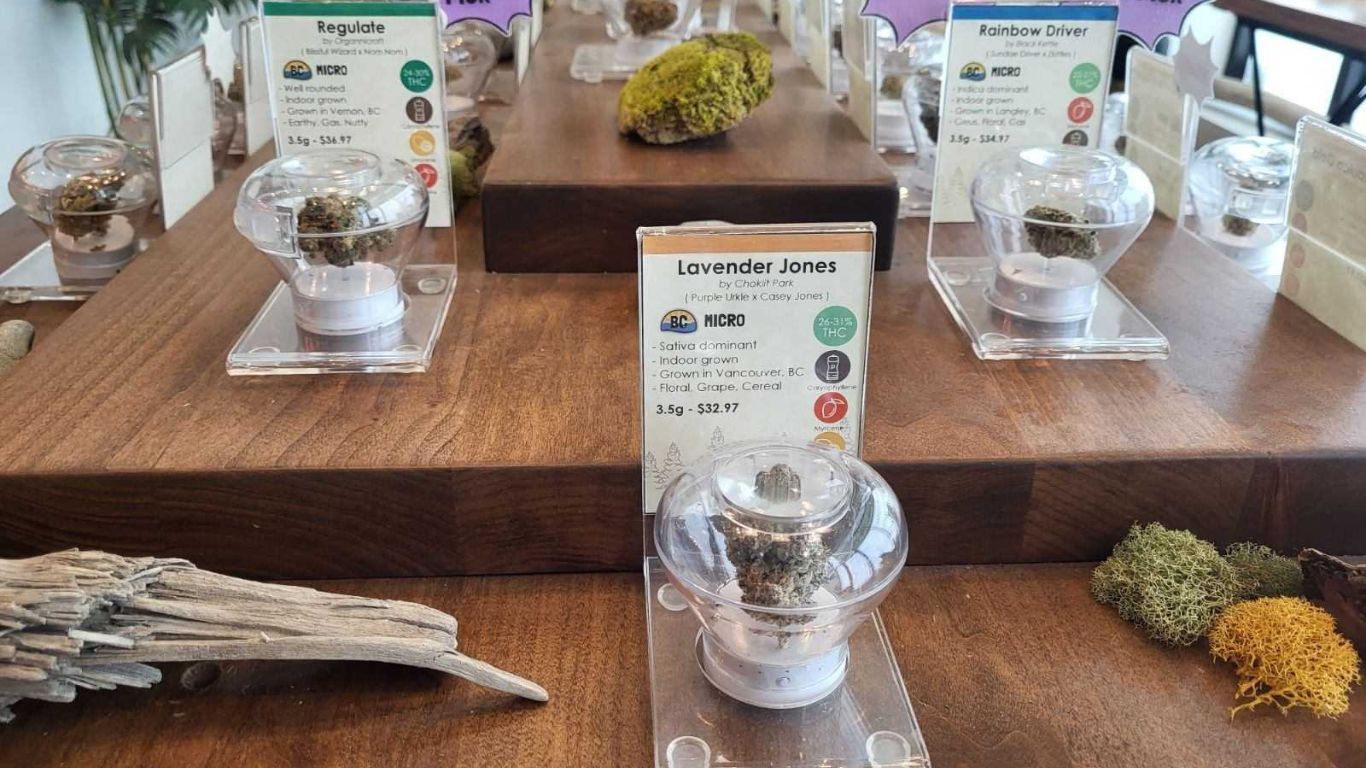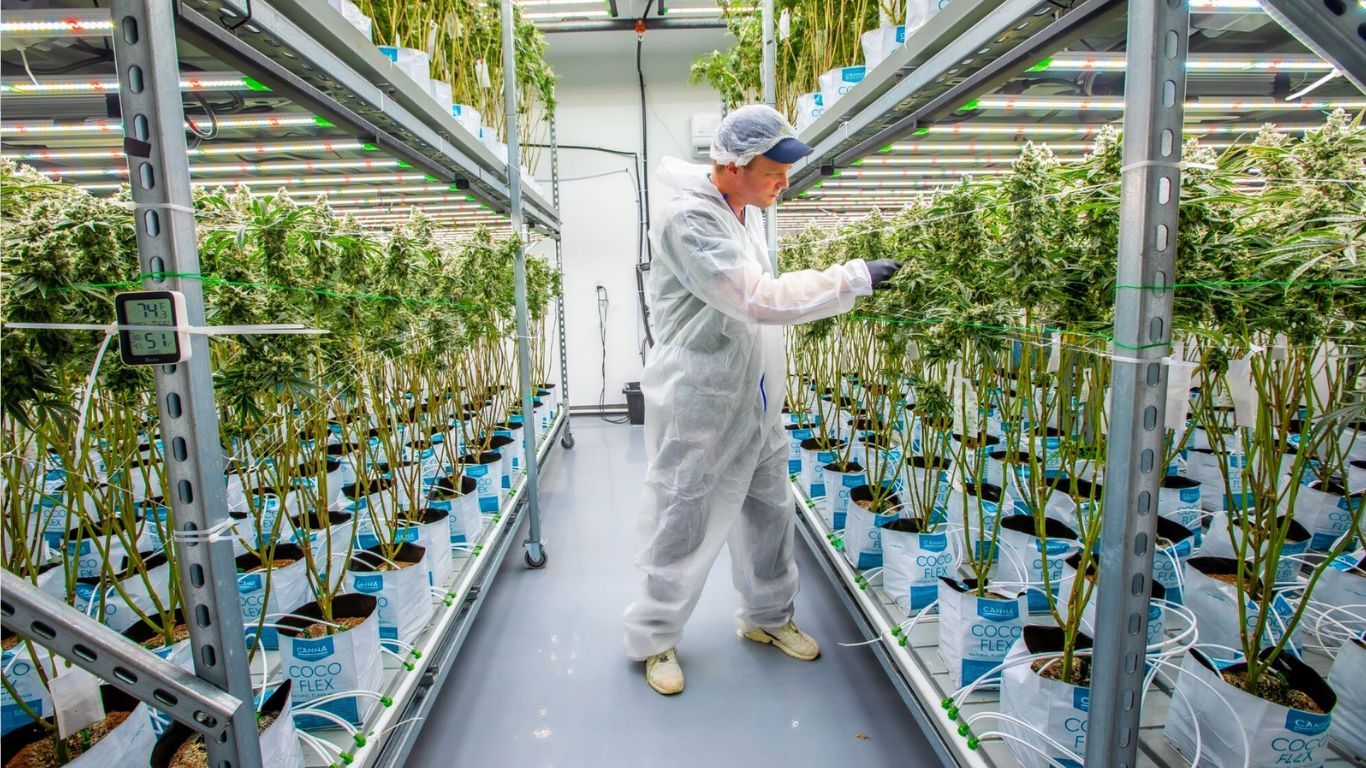
| COMPANY: | Okanna Craft |
| LICENCE TYPE: | Micro Cultivation, Nursery |
| APPROACH: | Indoor |
| TIMELINE: | ~1 year (late 2019 to December 2020) |
| COST: | ~$2m |
| FACILITY: | Retrofit indoor space |
The family behind Okanna Craft is another success story of a legacy BC grower transitioning into the legal recreational market, but the process wasn’t easy, they say.
Now that they have their first harvest ready for sale soon, they’re eager to share their story of the long road it took to get to this point.
Growing inside a facility they bought several years ago operating under their ACMPR licence, Travis Tully, along with his mother Nanette Tully and stepfather began retrofitting the four unit building to hold up to four licenses, micro and nursery, in 2018.
Although already using the space for cannabis, the trio says they spent several hundred thousand dollars retrofitting the interior to bring it up to the regulations, often stretching themselves financially thin, with the hope they would soon get a licence and could begin seeing the rewards. The retrofits, they estimate, were around $750,000 for the licence.
Travis, the family’s grower, has spent years cultivating this craft in BC, having taken an interest in cannabis plant science in his teens and with an entrepreneurial spirit, he found his hands in the dirt and a connection to the plant. When Travis saw a way to grow legally on the horizon, his desire to share his craft cannabis became his goal. He approached his mother and stepfather for support and they didn’t hesitate to put the plan in motion and apply for their Micro-cultivation license as well as a nursery license for their Kelowna facility.
“We still don’t know what it will look like, but we have some creative ideas and will be working with the right team to support our farmgate vision. We see a lot of tourist traffic, especially in the summer.” Travis says. “And it will be a great opportunity to showcase BC Bud in its natural habitat.”
Travis Tully, Okanna craft
Although they initially planned for an additional micro cultivation and nursery licence, Travis’ mother Nanette, who manages Okanna’s sales and marketing, along with several other responsibilities, says they are currently reevaluating and diversifying potentially looking at a processing licence.
“We’re looking at getting our own processing and sales licence, absolutely,” says Nanette. “But we’re going to start slow because we’re farmers really. But we’re looking at starting processing with a pre-roll solution, as pre-rolls seem to be contracting out and we need to evaluate what is best for our flower, our bottom line and supporting the craft community.”
The family also intends to get their own processing and sales licence, says Travis, because they hope to be able to open their own retail farmgate store once BC allows it. Located right along Kelowna’s rail trail, and in close proximity to the Okanagan UBC campus, their property is perfectly suited to cater to consumers living in and visiting the Okanagan Valley.
“We still don’t know what it will look like, but we have some creative ideas and will be working with the right team to support our farmgate vision. We see a lot of tourist traffic, especially in the summer.” Travis says. “And it will be a great opportunity to showcase BC Bud in its natural habitat.”
New Cultivars
Although the process of licensing took longer than they anticipated, the extra time has given them a chance to observe the market and make important changes, says Nanette. For one, they have had to reprioritize which cultivars they first bring to market, she says.
“If we would have come into the market a year ago, the market wouldn’t have been ready for us,” explains Nanette. “And we wouldn’t have been ready for the market. What we’ve learned in the last year with all the pitfalls we’ve gone through has staged us for where we are now.”
Originally, they had hoped to bring a cultivar they have a lot of experience growing, Tora Bora, but because it has less than 20% THC they decided to wait until the market is more receptive to that kind of cannabis. Even the strain they decided on for their first entrance into the market, Blue Coma, she says is not as high in THC as others, but says the high terpene count more than makes up for this.
“We have decided to go with God’s Berry, a cross between Kish and Gods Bud, a great smoke with a strong berry fruit smell and taste, a great chunky frosty bud that will not disappoint. We are growing for the legacy and new consumer to enjoy true BC Bud again”.
Securing unique genetics that have yet to be seen on the legal market is a big part of what they hope can distinguish themselves in the market, says Travis. Okanna brought in around 100 different cultivars, and he expects to choose the best of the bunch, narrowing his picks to about thirty in the next year or so as they use their nursery space to pheno hunt the best varieties.
Working with another BC-based micro*, Joint Ventures in Salmon Arm, they expect to have Blue Coma on shelves in BC, Alberta and Saskatchewan in the coming months. They also hope to release pre rolls in partnership with another micro cultivator under their proprietary pre-roll brand tOKANNAgan.
*Note: Joint Ventures recently amended their licence from micro to standard.
Challenges for growers transitioning to the legal market
Working with A like-minded processor like Joint Ventures, says Nanette, has been a positive experience.
“What Joint Ventures does for us, for example, is great. Their sole purpose is to package and to distribute products for their cultivators. Their mission is to transition and this aligns with our values.”
These kinds of partnerships are important, she says, because a lot of the micros getting licenced might be good at growing cannabis, but they don’t necessarily know how to run a business or market and network their products and brand.
“This has been the hardest thing we’ve ever done in our whole life,” she says. “It’s been the scariest thing we’ve ever done in our whole life. Just in terms of financially, legally. We’re just seeing the light at the end of the tunnel right now.”
Nanett Tully, Okanna Craft
Working with the BC Craft Farmers Co-op, Nanette says she sees this as one of the biggest challenges for the success of many micros.
“I see (business acumen) as a big hurdle for the micro cultivators,” says Nanette. “Just as an example, there are farmers sitting on their product right now who can’t sell it. They call processors who don’t call them back. At the co-op, we’re addressing this. We’re educating people on this right now, every day.”
“This is often missed,” she continues. “They’re farmers, they’re not business people. You can have the best product and not know how to market it. Or you can have a mid-grade product and do great marketing and make more than the guy who doesn’t know how to market.”
She points to other successful micro brands like North 40 and Dunn Cannabis, who have built the right partnerships and been active and engaging online to help build brand awareness.
“This has been the hardest thing we’ve ever done in our whole life,” she says. “It’s been the scariest thing we’ve ever done in our whole life. Just in terms of financially, legally. We’re just seeing the light at the end of the tunnel right now. But have we stretched ourselves and put our entire savings into this, believing in this vision? Now is when we need to make money to make this work.”












